
REVUE DE METAPHYSIQUE ET DE MORALE
Scope & Guideline
Engaging with Fundamental Questions of Existence
Introduction
Aims and Scopes
- Metaphysical Inquiry:
Engagement with core metaphysical concepts including existence, identity, and reality, often through the lens of historical figures and movements such as Descartes, Kant, and the Enlightenment. - Ethics and Moral Philosophy:
Exploration of moral theories, ethical dilemmas, and the philosophical underpinnings of moral reasoning, focusing on historical and contemporary perspectives. - Philosophy of Mind and Consciousness:
Examination of the nature of consciousness, emotional experience, and the mind-body problem, integrating insights from various philosophical traditions. - Historical Philosophy:
Analysis of philosophical trends and ideas from historical texts, bringing to light their relevance to modern philosophical discourse. - Interdisciplinary Approaches:
Integration of philosophical analysis with insights from psychology, sociology, and political theory, reflecting the journal's commitment to a broad understanding of philosophical issues.
Trending and Emerging
- Artificial Intelligence and Ethics:
The intersection of artificial intelligence and ethical considerations is gaining traction, highlighting the philosophical implications of technology on human values and moral reasoning. - Philosophical Anthropology:
An increased focus on philosophical anthropology indicates a growing interest in understanding human nature, identity, and the social implications of philosophical thought. - Environmental Ethics:
Emerging discussions surrounding environmental ethics reflect a contemporary concern for ecological issues and ethical consumption, marking a shift towards addressing global challenges. - Interdisciplinary Philosophy:
There is a notable trend towards interdisciplinary approaches that integrate philosophy with fields such as cognitive science, neuroscience, and social theory, enriching philosophical discourse. - Paradox and Its Implications:
The exploration of paradoxes, particularly in relation to ancient philosophy and ethical dilemmas, suggests a renewed interest in complex philosophical problems and their implications for contemporary thought.
Declining or Waning
- Classical Political Philosophy:
Themes centered around classical political philosophy, particularly those focused on figures like Hobbes, Locke, and Rousseau, appear to be less prevalent, suggesting a waning interest in foundational political theories. - Natural Law Theories:
Discussions surrounding natural law and its implications for contemporary ethical and legal frameworks have decreased, indicating a possible shift towards more modern interpretations of law and morality. - Specific Historical Figures:
While historical analysis remains vital, the focus on specific historical figures such as Hegel and Kant has diminished, possibly in favor of broader thematic explorations. - Emotion in Classical Contexts:
The exploration of emotions within classical philosophical contexts seems to have lessened, as the journal shifts towards more contemporary frameworks of emotional analysis. - Philosophical Aesthetics:
There is a noticeable reduction in works dedicated to aesthetics, particularly those that engage classical theories of beauty and art, suggesting a trend towards more pragmatic or applied philosophical discussions.
Similar Journals
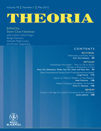
Theoria-A Swedish Journal of Philosophy
Engaging Minds Through Rigorous Academic DialogueTheoria - A Swedish Journal of Philosophy, published by WILEY, stands as a significant contributor to the realm of philosophical discourse since its inception in 1935, with a continued commitment to advancing scholarly conversation up to 2024. With its ISSN 0040-5825 and E-ISSN 1755-2567, the journal holds a prestigious position in the field, ranking in Q2 among philosophy journals and achieving an impressive 66th percentile ranking in the Scopus Arts and Humanities category. Although it does not currently provide Open Access options, Theoria remains a vital resource for researchers, professionals, and students seeking in-depth analyses and innovative perspectives within contemporary philosophy. Its central objective is to foster rigorous academic dialogue that explores diverse philosophical inquiries, making it an essential platform for those invested in the pursuit of knowledge and critical thought.
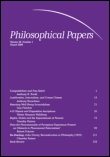
Philosophical Papers
Championing Rigorous Scholarship in PhilosophyPhilosophical Papers, an esteemed journal published by Routledge Journals, Taylor & Francis Ltd, stands as a pivotal resource in the field of philosophy. Having established its presence since 1972, this journal has converged a wealth of intellectual discourse and contributes to the continuous development of philosophical thought until 2024. With a prestigious Q1 category ranking in the arts and humanities, and a notable 86th percentile ranking in Scopus's philosophy category, it underscores its commitment to rigorous scholarship and influential research. Although Open Access options are not currently available, the journal remains a vital platform for philosophers, researchers, and students aiming to engage with pivotal philosophical debates and advancements. Set in the UK, Philosophical Papers exemplifies the intersection of tradition and innovation in philosophical inquiry, making it an indispensable reference for anyone dedicated to exploring the complexities of human thought and existence.
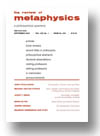
REVIEW OF METAPHYSICS
Illuminating the foundations of philosophy through rigorous discourse.REVIEW OF METAPHYSICS is a distinguished journal published by PHILOSOPHY EDUCATION SOC, INC, dedicated to advancing scholarly discourse in the field of philosophy. With an ISSN of 0034-6632 and an E-ISSN of 2154-1302, this journal has been a crucial platform for philosophical inquiry since its inception in 1975, converging its rich content from 1992 and continuously serving the academic community up to 2022. Based in the United States, specifically at 223 Aquinas Hall, Catholic University America, Washington, DC, it has secured a reputation for quality, reflected in its placement within the Q3 category of the 2023 Philosophy rankings, and a Scopus rank of 367 out of 806 in Arts and Humanities, placing it in the 54th percentile. Although it does not offer open access options, the REVIEW OF METAPHYSICS remains an essential resource for philosophers and students alike, fostering critical perspectives on metaphysical issues, and thereby contributing significantly to the advancement of philosophical studies.

REVUE INTERNATIONALE DE PHILOSOPHIE
Exploring the Depths of Philosophical ThoughtREVUE INTERNATIONALE DE PHILOSOPHIE, published by REVUE INT PHILOSOPHIE, is a prestigious journal in the field of philosophy, based in Belgium. With an ISSN of 0048-8143 and an E-ISSN of 2033-0138, this journal has been a vital platform for philosophical discourse since its inception in 1983, successfully evolving through various phases until 2024. Despite currently being positioned in the Q4 category of Philosophy according to the 2023 rankings, it serves as an important venue for scholars and students alike, allowing for a diverse exploration of philosophical thought. Although it is not an Open Access publication, the journal fosters a rich environment for rigorous scholarly research and debate. By presenting articles that challenge and inspire, REVUE INTERNATIONALE DE PHILOSOPHIE ensures that it remains an essential resource for anyone engaged in philosophical inquiry.
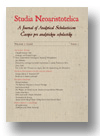
Studia Neoaristotelica-A Journal of Analytical Scholasticism
Unraveling the Threads of Scholastic TraditionStudia Neoaristotelica - A Journal of Analytical Scholasticism is a distinguished academic journal dedicated to the exploration and analysis of Aristotelian philosophy and its contemporary applications. Published by the PHILOSOPHY DOCUMENTATION CENTER in Germany, this journal seeks to foster scholarly discourse in the field of philosophy, particularly through the lens of analytical scholasticism. While it holds an impact factor placing it in the Q4 quartile within the philosophy category according to Scopus, the journal is committed to advancing philosophical inquiry from 2015 to 2023, positioning itself as a vital resource for researchers, professionals, and students alike. Although it does not currently offer open access, the journal ensures the dissemination of meaningful research that prompts critical thinking and contributes to academic debates within the discipline. As a platform for emerging voices and respected scholars, Studia Neoaristotelica aims to bridge historical philosophical concepts with modern analyses, making it an essential addition to the scholarly community.

JOURNAL OF PHILOSOPHY
Exploring the depths of human understanding.The Journal of Philosophy, with ISSN 0022-362X and E-ISSN 1939-8549, is a premier academic publication in the field of philosophy, published by J Philosophy Inc. Located in the United States at Columbia University, 709 Philosophy Hall, New York, NY 10027, this esteemed journal serves as a critical platform for rigorous scholarly discourse and innovative research. With a commendable Impact Factor and ranked in the top Q1 category for Philosophy in 2023, the journal holds a prominent position within the academic community, attracting contributions that push the boundaries of philosophical inquiry. The Journal of Philosophy has consistently ranked in the 91st percentile in the Scopus Arts and Humanities rankings (Rank #65/806), underscoring its influence and the relevance of its published works. Though it operates on a subscription model, the journal’s extensive back-catalog and current issues provide invaluable resources for researchers, professionals, and students alike, promoting a deeper understanding of philosophical concepts and stimulating meaningful discussions in contemporary thought.
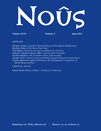
NOUS
Driving excellence in philosophical research and debate.NOUS is a prestigious academic journal published by WILEY, specializing in the field of Philosophy. Since its inception in 1989, it has maintained a strong reputation within the philosophical community, currently earning a remarkable position in the top quartile (Q1) of its category as of 2023. With an impressive Scopus ranking of #22 out of 806 in the Arts and Humanities – Philosophy category, and achieving a 97th percentile, NOUS serves as a pivotal platform for scholarly discourse, innovative research, and critical thinking. The journal prioritizes high-quality articles that contribute significantly to various philosophical debates, thereby attracting both established and emerging scholars. Although it does not offer an open access option, NOUS is a crucial resource for anyone engaged in serious philosophical inquiry and is dedicated to advancing knowledge and understanding in this rich field.

Acta Philosophica
Illuminating Ideas in the Realm of PhilosophyActa Philosophica is a prestigious academic journal dedicated to the exploration and analysis of philosophical thought. Published by Fabrizio Serra Editore in Italy, this journal serves as a vital platform for scholars, presenting rigorous research that contributes to the field of philosophy. With an ISSN of 1121-2179 and an E-ISSN of 1825-6562, Acta Philosophica is indexed in prestigious databases, enhancing its visibility and impact within the academic community. Active since 2011, this journal has emerged as a significant player in the discipline, currently positioned in the Q3 quartile for Philosophy in 2023 and ranked #557 among 806 journals in the Arts and Humanities category on Scopus, placing it in the 30th percentile. Researchers and students alike will find valuable insights within its pages, as it covers a broad spectrum of philosophical inquiries. Although not an open-access journal, its rich content makes it essential reading for anyone invested in advancing philosophical discourse.
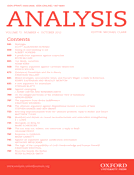
ANALYSIS
Exploring the Depths of Philosophical InquiryANALYSIS, an esteemed journal published by Oxford University Press, ranks in the top quartile (Q1) within the field of Philosophy, showcasing its significance in disseminating cutting-edge research and critical studies since its inception in 1933. With an ISSN of 0003-2638 and an E-ISSN of 1467-8284, the journal has maintained a dedicated readership across various converged publications from 1933 to the present. Based in the United Kingdom, ANALYSIS is committed to exploring foundational philosophical questions and advancing theoretical dialogue in both traditional and contemporary contexts. The journal is recognized for its rigorous peer-review process and is indexed in Scopus, reflecting its solid standing at rank #178/806 in the Arts and Humanities domain, encompassing the 77th percentile of its category. Although currently not available as an open-access journal, ANALYSIS provides invaluable insights and a platform for philosophical discourse that appeals to scholars, professionals, and students alike, fostering a deeper understanding of the complexities in the world of philosophy.
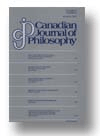
CANADIAN JOURNAL OF PHILOSOPHY
Elevating Discourse, Inspiring InquiryCanadian Journal of Philosophy, published by Cambridge University Press, stands as a pinnacle of scholarly discourse in the field of philosophy. With its ISSN 0045-5091 and E-ISSN 1911-0820, this esteemed journal has cemented its reputation since its inception in 1971, continuing to engage with contemporary philosophical issues up to 2024. The journal is highly regarded, currently holding a Q1 rank in Philosophy and positioned in the 89th percentile of its category according to Scopus rankings. Its focus is on advancing philosophical inquiry, offering a platform for both established scholars and emerging voices to share significant research, critique, and innovative ideas. While the journal is not open access, it provides essential insights that are invaluable for researchers, professionals, and students alike, fostering an environment of intellectual exchange and growth in the philosophical community.